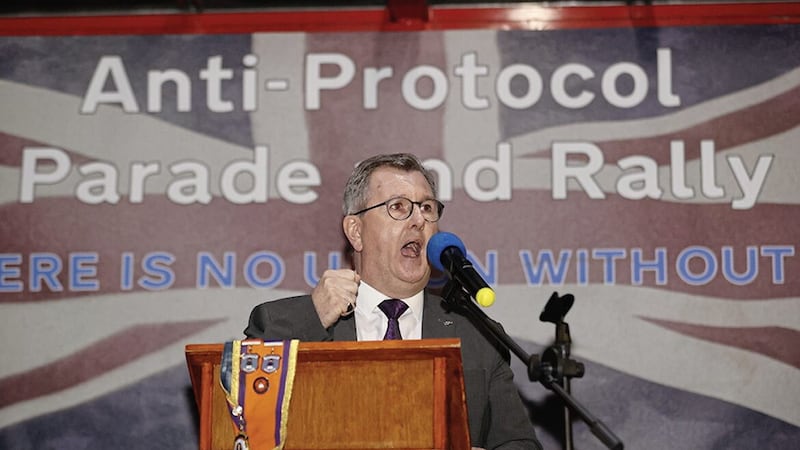A recurring theme in our politics is the claim that unionists are afraid, concerned or anxious about political developments, real or potential.
Citing this has often been employed as a blunt political tactic to frustrate progress and the development of a fairer and more equal society in the north of Ireland.
Thus has it come to pass that the merest mention of Irish unity can elicit accusations of promoting division or exacerbating tensions from those playing this cynical game.
It is also for this reason that Irish language signs are vehemently rejected in what is claimed to be a fear of the place looking and feeling less British - as opposed to the more straightforward and honest charge of base prejudice.
Similarly, whilst French, American and - most recently - Brazilian citizens living here are supported in participating in their respective country’s presidential elections, all strands of unionism bitterly oppose the idea of Irish citizens residing in this part of their own country doing the same, though it is worth noting that this is a matter completely beyond their control and wholly for the government in Dublin to facilitate.
The success of last week’s Ireland’s Future event in Dublin can partly be measured by the willingness today of the political leaders of almost every pro-Irish unity party to ignore those cynically using the fear and anxiety tactic and instead increasingly acknowledge an acceptance that planning for unity is now an imperative. A particularly significant development during the week was the announcement by the Irish finance minister, Paschal Donohoe, that his government would consider planning for how unity may impact upon public finances, illustrating a desire to begin using the powerful institutions of the Irish state to help shape the case for unity. Expect this to intensify under a Mary Lou McDonald led government.
Alone in standing against this would appear to be Fianna Fail’s Micheál Martin, who looks destined to be the last holder of the Office of the Taoiseach to hold to a line which is tantamount to abdicating responsibility to lead in the process of nation building that must define the second century of independent Ireland’s existence. His soon-to-be successor, Fine Gael’s Leo Varadkar, has deftly manoeuvred his party into the position of being more credible advocates for constitutional change, not least due to the consistently impressive contributions of the party’s south Dublin TD, Neale Richmond.
Another myth commonly peddled in these parts is that unionists throughout their history have repeatedly been betrayed from London.
“What a fool I was. I was only a puppet, and so was Ulster, and so was Ireland, in the political game that was to get the Conservative Party into power.”
Those famous words uttered wistfully by the father of unionism, Edward Carson, a century ago have been repeated in newspaper columns and by politicians on countless occasions down through the decades to convey a sense of betrayal amongst unionists at the actions and determinations of British governments.
According to the narrative, honest and selfless unionists have given their loyalty to Britain throughout the generations only to be let down by duplicitous governments.
The truth is that, time and time again, successive British governments have acted to give unionism an advantage that it repeatedly and recklessly throws away on account of an inability and unwillingness to adapt to changing circumstances.
At every juncture upon which the cries of betrayal have been raised, unionist leaders rejected alternative courses of action which would have left the unionist cause in a stronger position.
Britain’s decision to unilaterally seek to impose the partition solution on Ireland gift-wrapped to unionism a state with every conceivable advantage from which to plan and shape a future.
The prorogation of Stormont, disbandment of sectarian militia, introduction of power-sharing, legislation to promote fair employment, onset of the Anglo-Irish Agreement, Downing Street Declaration, reform of policing, introduction of a Parades Commission and Irish language legislation. Each and every one of these steps was taken by British governments not to undermine the Union but rather to effectively improve the prospects for prolonging it through reform and often with the rather ironic intention of thwarting the pro-Irish unity agenda of republicans. It mattered not, for each development provoked the now common refrain of betrayal and was proceeded with in spite of ferocious unionist opposition.
And so it is with the Northern Ireland Protocol, an arrangement conceived to offer a best of both worlds outcome for a region forever destined to be a place apart.
In the weeks and months ahead, it is very likely the European Union and the Conservative government will broker a deal to finally put the vexed issue to bed. The howls of betrayal from unionist leaders won’t be far away, yet those most guilty of betraying the cause of unionism are the very people incapable of recognising that its survival is now wholly contingent upon choosing generosity, compromise and conciliation over conflict.









